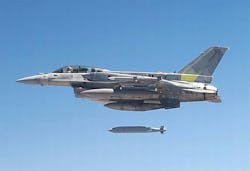Raytheon to build 200 data-linked target-penetrating smart munitions for government of Qatar
Officials of the U.S. Naval Air Systems Command at Patuxent River Naval Air Station, Md., are asking the Raytheon Missile Systems segment in Tucson, Ariz., to produce 200 AGM-154C Block III joint standoff weapon (JSOW) munitions. The contract also calls for Raytheon to build 212 containers, spare parts, and technical support for the government of Qatar.
The AGM-154 JSOW is medium range precision-guided glide bomb for attacking defended targets from outside the range of standard anti-aircraft defenses. Pilots typically fire JSOW from ranges of 22 to 70 nautical miles. The JSOW Block III adds a Link-16 weapon data link and moving maritime target capability to the AGM-154C.
The weapon can be launched from F/A-18, F-16, F-15, F-35, and Jas Gripen jet fighter-bombers; as well as from B-1B, B-2A, and B-52H long-range jet bombers. The AGM-154C JSOW unitary variant uses an imaging infrared seeker with autonomous guidance.
The two-stage AGM-154C carries the BROACH warhead made up from a WDU-44 shaped augmenting warhead and a WDU-45 follow through bomb, and is designed to attack hardened targets like armor, concrete, and earth to enable a large following warhead to explode inside the target. The JSOW is 13 feet long and weighs about 1,000 pounds.
On this contract Raytheon will do the work in Tucson, Ariz.; Glascoed, Wales; Dallas and Richardson, Texas; Glasgow, Scotland; Vergennes, Vt; Minneapolis; Andover, Mass.; McAlester and Tulsa, Okla.; Joplin, Mo.; Goleta and Valencia, Calif.; Williamsport, Pa.; Berryville, Ark.; Bohemia and Orchard Park, N.Y.; Pinellas Park, Fla.; Boulder, Colo., and other locations, and should be finished by June 2020.
For more information contact Raytheon Missile Systems online at www.raytheon.com, or Naval Air Systems Command at www.navair.navy.mil.
Ready to make a purchase? Search the Military & Aerospace Electronics Buyer's Guide for companies, new products, press releases, and videos
